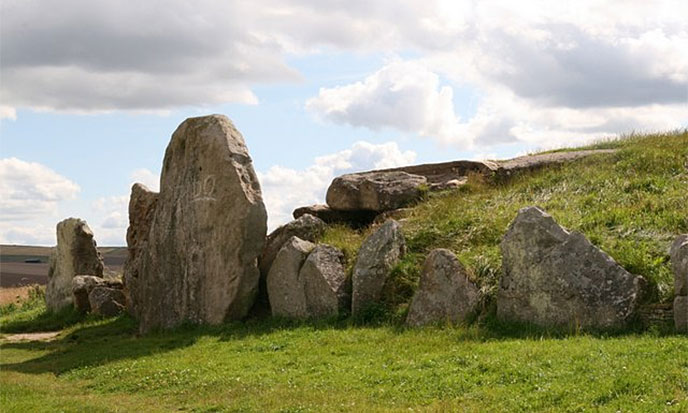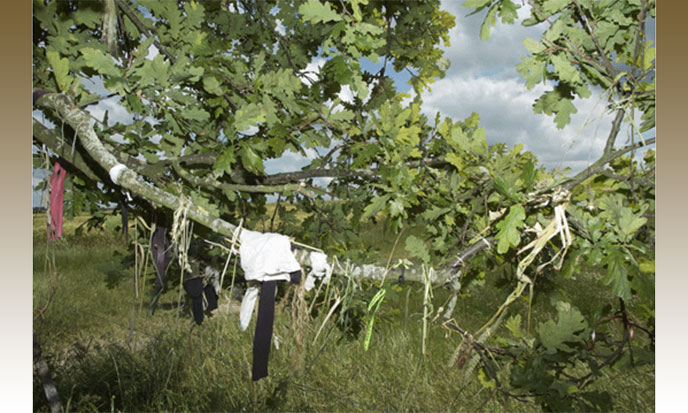
We have seen how the “Former Gods” attracted lightning and used its energy for various purposes, in huge megalithic power plants like that of Avebury. In Avebury’s lightning plant, there are four main machines,the pyramidal antenna, the circular spark gap, the double star distributor and the transmission line. The fifth element composing this site, West Kennet Long Barrow, is not a machine. Dolmens or long barrows were places of initiation, or, if you like, electrotherapy clinics.
The lightning cure, or initiation by lightning, was the place’s ultimate purpose. However lightning plants always represented dangerous perimeters. Electrical power was channeled through the rows of menhirs which formed polarized power lines. In terms of energy transmission, the Atlanteans have used other techniques: the flow of a river or a channel, or a mere trickle of water in troughs of stone, as in Tiahuanaco in the Andes, or in pipes, as in Teotihuacan, Mexico.
Note that all civilizations of lightning were ancient hydraulic civilizations. The level of knowledge in this field has never been equaled in the future. These stone channels, polarized as the Avebury standing stones, were filled with water to form a power line much cheaper than the impressive boulders of western lines. And when it came to transport energy over long distances, they used other techniques: simple beds of pebbles arranged under some earthen levees could perform more or less the same function.
1.9 miles south from the pyramid of Silbury Hill, circulates a mysterious earthen levee quite similar to those which enclose the stone circles of Avebury Henge. Oriented west-east, this dyke is composed of three parts of 9, 14 and 12 miles long with missing areas. English people call it Wansdyke.
There is little archaeological evidence about it, and its origin is unclear. To some people, it would date from the Celts. We think it is much older. Other earthen levees dotted dash the area between Avebury and Wansdyke. Could this be the remains of a “long distance” power line?
On the top of big stones, the unleashing fire from heaven was a fascinating show, while the celestial fury was beneficial to the candidates to awakening who came here and receive their electrotherapy treatment under the surrounding long barrows. More than ten of them surrounded the great machine of Stonehenge. But on the site of Avebury, West Kennet Long Barrow is the only dolmen that is not ruined. The other ones are but ruined mounds.
West Kennet Long Barrow distills a powerful palpable charm. Every time I come to Avebury, I never fail to go there.
West Kennet Long Barrow is located 500 yards south from the conic pyramid of Silbury Hill, on the other side of Kennet River, were the lightnings. were formerly heading for. Under this covered walkway, the candidates to awakening were really in the front row. They, the apprentices, heart pounding, dry lips, awaited the great mystery of life or death. The lightnings struck the pyramid of Silbury and stream down its sides as balls of light, which hopped towards the covered walkway.
Their movements were not anarchic, but guided by a facetious intelligence. Some balls of white fire bounced on the body or the head of apprentices, who did not seem affected. On the contrary, they were full of energy, gulping in a shot a good flash of Vril energy. In their brains, the pineal, excited by the surge, opened wide the last chakra, that of the fontanelle, and the apprentices became what they should have never ceased to be: Buddhas of light.

A thoughtful oak collects the wishes of the visitors who knot ribbons to its branches. In Brittany, this practice is common, as in the Tomb of Merlin. The walk across the fields is pleasant and the spectacle of the meditation of British people in the megalithic monuments is very moving. The loving respect they have for nature is unknown to French people. Certainly, the old religion of the Celts has been preserved here from both Latin and cartesian influences.
Nature is a temple, and British people still know it. The spectacle of all these light balls bursting from the spark gap to fall in living cataract and bounce from menhir to menhir fascinated many viewers. That is why the sites of lightning power plants, like Avebury, Stonehenge, Locmine, Carnac, are surrounded by covered walkways and dolmens. These solid shelters, covered originally by their earthen mounds, were all observatories and initiation temples were the storm raged…
Temples at the bottom of which the initiates could see trickling fountains of light… until a ball, more adventurous or better inspired, gets into the rock trench and comes to revolve around the initiate who held his breath.
The spectators gathered around the security perimeter evoke other ones, to whom they may be contemporary. The scene takes place five thousand years ago, in Egypt, in the Nile Delta. A crowd assembled at a safe distance of the Great Pyramid of Giza, during a storm. Agape, shivering, frenetic, the faithfuls admire from afar the amazing spectacle of the anvil under the hammer of Thor, the white great pyramid one hundred, one thousand times struck by lightning that surrounds it with a luminous halo.
All the horizon is illuminated by it. This why the viewers named the pyramid: “the luminous horizon of Cheops.”
This is word for word the Egyptian name of the Great Pyramid.


